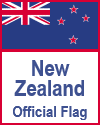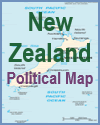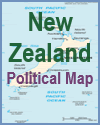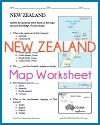| New Zealand Geography Education |
| www.studenthandouts.com > World Geography > Oceania > New Zealand |
 |
 |
 |
 |
|||||||
| Kiwi Flag | New Zealand Political Map | New Zealand Global Position Map | New Zealand Map Worksheet |
| Printable Handwriting and Spelling Practice Worksheets |
| Cursive | Print - Printable handwriting practice worksheet for kids featuring "New Zealand" |
|
Learning about New Zealand is fundamental to any World Geography course for several important reasons.
Unique Geography: New Zealand's geography is distinctive, featuring a diverse range of landscapes, from snow-capped mountains and fjords to lush forests and coastal regions. Studying New Zealand allows students to explore the Earth's geographical diversity. Tectonic Activity: New Zealand is located on the boundary of the Pacific and Indo-Australian tectonic plates, making it a region of high tectonic activity. This provides an opportunity to study earthquakes, volcanoes, and plate tectonics in a real-world context. Maori Culture: New Zealand has a rich indigenous culture represented by the Maori people. Learning about the Maori culture and its connection to the land is an opportunity to explore cultural geography and indigenous perspectives. Colonial History: New Zealand's history includes European colonization and the Treaty of Waitangi, which has implications for land rights and cultural interactions. This history is a valuable case study for colonialism and its impact on indigenous populations. Environmental Conservation: New Zealand is known for its efforts in environmental conservation and sustainability. Studying New Zealand's initiatives in preserving its unique ecosystems contributes to discussions about global environmental challenges. Economic Significance: New Zealand is an important player in the global agricultural and dairy industries. Understanding its role in international trade and the global economy is relevant to economic geography. Cultural and Regional Differences: New Zealand's North and South Islands have distinct cultures and landscapes. This allows students to explore regional variations within a single country. Tourism: New Zealand is a popular tourist destination known for its outdoor activities and natural beauty. Studying tourism in New Zealand provides insights into the global tourism industry and its impact on local economies. Isolation and Connectivity: New Zealand's isolation from other landmasses and its reliance on sea and air connections for trade and travel make it an interesting case for discussions on isolation, connectivity, and globalization. Biodiversity: New Zealand is home to unique flora and fauna, including the flightless kiwi bird and the ancient kauri tree. Studying New Zealand's biodiversity and conservation efforts contributes to discussions on global biodiversity. Geopolitical Relations: New Zealand's geopolitical relations, including its alliances and trade partnerships, contribute to global political discussions and regional stability. Human-Environment Interaction: The way in which New Zealanders interact with their environment, from agriculture to conservation, provides examples of human-environment relationships and sustainable practices. Natural Hazards: New Zealand's exposure to natural hazards such as earthquakes, volcanic eruptions, and tsunamis offers opportunities to study disaster geography and preparedness. Global Citizenship: Learning about New Zealand fosters an understanding of global citizenship, as it encourages students to appreciate and respect different cultures, environments, and perspectives. Incorporating New Zealand into a World Geography course enriches students' understanding of geographical concepts, cultural diversity, environmental challenges, and global interconnections. It provides a well-rounded and comprehensive view of geography in a specific and unique context. |
| www.studenthandouts.com > World Geography > Oceania > New Zealand |






